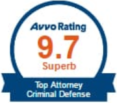Skilled Theft Crime Defense Attorney
in Madison, Georgia

Taking someone else’s property whether by trick or fraud or through the threat of violence—with a weapon or with something made to look like a weapon—carries severe penalties in the State of Georgia. Your freedom is on the line. When facing felony charges of theft or armed robbery, you want to have a competent and skilled theft and armed robbery attorney in Georgia by your side.
Michael Fulcher Law has over 17 years of experience as a prosecutor, public defender, and privately retained attorney who knows Morgan County and the surrounding areas. Call or email to schedule a free consultation now to preserve your rights and all of your defenses.
How a Theft Crimes Defense Lawyer In Georgia Can Help
There are varying degrees of seriousness connected to the crime of theft. First, there is the value of the stolen object. If valued over $1,500, you are facing a felony charge.
How the property is stolen is also relevant. Theft is taking someone else’s property for yourself: theft, theft by deception, and shoplifting. A theft committed in the immediate presence of the owner of the property is considered a robbery. Armed robbery is taking someone else’s property in their immediate presence using a weapon or something made to look like a weapon. Even if you do not actually have a weapon, but pretend that you do, or even suggest that you might, it can lead to the serious charge of armed robbery. There is no leniency upon conviction for the crime of armed robbery. A conviction carries a mandatory minimum sentence of 10 years in prison, with sentences of up to 20 years to life, without possibility of parole.
Defending against felony charges of theft or armed robbery requires that you retain a theft and armed robbery attorney in Georgia with considerable experience dealing with police and prosecutors, a deep knowledge of the law and criminal procedure, and a familiarity with the judges in the county.
Georgia Laws Governing Felony Theft
Stealing can be accomplished through a variety of methods. Stealing property valued over $1,500 is a felony in Georgia. The more valuable the property stolen, the higher the sentence – up to 20 years for each offense.
Theft: A person commits a theft when he or she unlawfully takes or, being in lawful possession thereof, unlawfully appropriates any property of another with the intention of depriving him of the property, regardless of the manner in which the property is taken or appropriated. To deprive means to withhold the property permanently or temporarily, or to dispose of the property in a way that makes it unlikely that the owner will be able to recover it.
Theft by Deception: A person commits the offense of theft by deception when he or she obtains property by any deceitful means or artful practice with the intention of depriving the owner of the property.
Deception is further defined as:
- Creates or confirms another’s impression of an existing fact or past event which is false and which the accused knows or believes to be false;
- Fails to correct a false impression of an existing fact or past event which he has previously created or confirmed;
- Prevents another from acquiring information pertinent to the disposition of the property involved;
- Sells or otherwise transfers or encumbers property intentionally failing to disclose a substantial and valid known lien, adverse claim, or other legal impediment to the enjoyment of the property; or
- Promises performance of services which he does not intend to perform or knows will not be performed.
Theft by Shoplifting: A person commits the offense of shoplifting when he or she alone or in concert with another person, with the intent of appropriating merchandise to his or her own use without paying for the same or to deprive the owner of possession thereof, does any of the following:
- Conceals or takes possession of the goods or merchandise of any store or retail establishment;
- Alters the price tag or other price marking on goods or merchandise of any store or retail establishment;
- Transfers the goods or merchandise of any store or retail establishment from one container to another;
- Interchanges the label or price tag from one item of merchandise with a label or price tag for another item of merchandise; or
- Wrongfully causes the amount paid to be less than the merchant’s stated price for the merchandise.
Armed Robbery: A person commits the offense of armed robbery when, with intent to commit theft, he or she takes property of another from the person or the immediate presence of another by use of an offensive weapon, or any replica, article, or device have the appearance of such weapon.
An offensive weapon includes weapons that are offensive per se as well as those objects that might not ordinarily be considered offensive, but which might have been used to produce death or bodily injury depending on how they were used.
To be released from jail during the pendency of any prosecution requires that the bond be set by the superior court judge, not the magistrate. It might take weeks before a bond hearing is set in superior court, which means that you will be held in jail waiting for that opportunity. A skilled armed robbery lawyer might be able to negotiate a bond release with the prosecutor, thus freeing you from jail sooner.
A per se offensive weapon might be a machete, sword, knife, or gun. There are no innocent uses of these objects. However, a razor, screwdriver, or penknife might have an alternative legal purpose. Whether it is considered an offensive weapon depends on how it was used.
The penalties for felony theft begin at a mandatory 1-year sentence up to 20 years. The penalties for armed robbery carry sentences between 10-20 years in prison with a minimum of 10 years without the possibility of parole. In extreme cases, a court could sentence a defendant to life in prison.
Even being charged as a “party to the crime” of armed robbery means a mandatory minimum of 10 years in prison. “A party to the crime” is a co-conspirator and accomplice who might have helped to analyze the site of the robbery, bought weapons, driven the getaway car, or engaged in some form of involvement.
The long term consequences of a felony conviction are devastating. In addition to having a permanent criminal record, once released from prison, your record might prevent you from gainful employment, access to credit, education, professional licensing, and housing.
CALL US NOW
FOR A FREE CONSULTATION
Facing legal challenges, whether it’s a DUI, criminal charge, or navigating traffic-related offenses, requires a skilled advocate. Turn to Morgan County’s Michael Fulcher Law for a blend of legal expertise and unwavering client service from a former Georgia prosecutor. Discover the optimal legal solution for your situation by calling our criminal defense law firm at (706) 438-1555 or reaching out online. Schedule your free consultation today and gain a clearer path forward.
Contact our Theft Crime Defese Attorney Today
You deserve skilled and competent legal representation when facing theft and armed robbery prosecution. A good lawyer will guide you through the stress of a prosecution while rigorously defending your rights, preserving defenses, and challenging the prosecution to be fair.
Michael Fulcher Law knows criminal law, with over 17-years of experience as a prosecutor, public defender, and privately retained defense counsel. That experience includes a deep understanding of law, criminal procedure, and familiarity with all of the players—police, prosecutors, and judges—in Morgan, Greene, Putnam, Jasper and Taliaferro Counties.
Michael Fulcher Law will fiercely defend your legal rights, honestly assess the strength of the prosecution’s case, and advise you on a course of action that is in your best interests.
With offices in Madison and Monroe, we are conveniently located. To accommodate you, we can also arrange for a confidential teleconference.
Call or contact us online today to schedule a free consultation. Your consultation with Michael Fulcher Law is confidential, covered by attorney-client privilege. Your frank answers to all questions will assure a realistic assessment of the charges so that we can advise you on your rights, defenses, and how to proceed.
Frequently Asked Questions
AMAZING WORK
“Mr. Fulcher has been tremendously helpful with my case. Since hiring him he has consistently returned my calls as quickly as he can. We discussed an ideal outcome, and I set about doing exactly as he said. Following his advice we were able to get a very favorable outcome. He is always quick to answer any questions, and has stayed very engaged with me throughout this ordeal. Michael provides excellent counsel, and I would recommend him to anyone!”
— TOM




